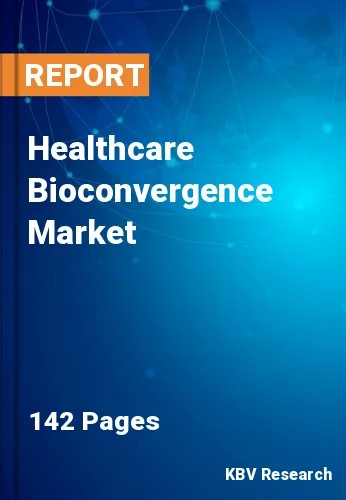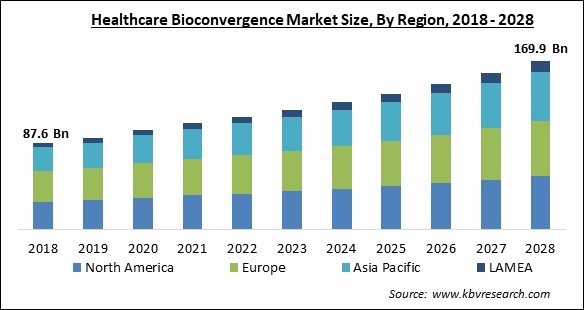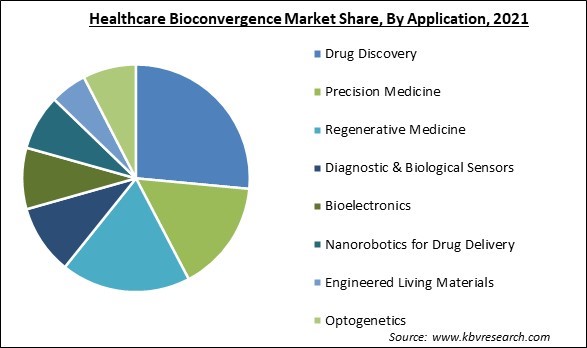
The Global Healthcare Bioconvergence Market size is expected to reach $169.9 billion by 2028, rising at a market growth of 7.0% CAGR during the forecast period.
Bioconvergence is an all-encompassing strategy that addresses many biotech chain links, including bioprinting, biomimicry, omics, and diagnostics. By combining biology with several engineering disciplines like nanotechnology, physics, computer science, advanced genetic engineering, artificial intelligence, material science, and electronics, this process is known as bio convergence.

Bioconvergence is a sector of the healthcare and life science research industries that stresses the interdependence of engineering, technology, and computerized systems. The idea behind bioconvergence is that biology and technology, the two cornerstones of biotechnology, aren't as incompatible as they first appear.
The concept of bioconvergence is not restricted to specific biotech chain phases. It's a method that can be used from beginning to end. The bioconvergence paradigm is at the foundation of many new fields in biotech, including omics, biomimicry, bioprinting, and diagnostics.
Researchers must produce outstanding advancements in medical research and therapy due to the rising prevalence of chronic diseases afflicting the global population. The race to have a significant influence is on. New cancer therapies, better medications and vaccinations, quick testing and precise diagnosis, better and simpler access to healthcare services via digital means, and so forth.
The COVID-19 pandemic had a significant influence on medical technology, drug development, and health technology. As a result of reducing the time needed to bring a drug to market by accelerating the discovery of the sequence, virtual selection, and process of validation, AI-based tools enable the prediction of drugs or peptide bonds straight from the genomic sequences of an infectious person. This results in the boost of drugs or vaccine development and advanced technologies. AI and ML technologies have helped in screening, prediction, forecasting, contact tracing, and drug/vaccine development during the ongoing COVID pandemic. The extensive use of COVID-19 has benefited the healthcare biotechnology business as a result of these aspects.
Similarly to manufacturing, the delivery of healthcare is about to undergo a fundamental shift into a new era of connected, smart healthcare. Industry 4.0 and the fourth healthcare revolution are currently emerging. In such a situation, the process of providing healthcare transforms into a cyber-physical system outfitted with wearables, RFID (radio-frequency identification), IoT, and various medical devices, medical robots, intelligent sensors, etc., that are incorporated with cloud computing, artificial intelligence, big data analysis, and decision support methods for achieving smart and interconnected healthcare delivery. Therefore, as a result of industry 4.0's widespread acceptance in the healthcare sector.
Every industry has specific financial needs and worries, whether they relate to accessibility, available channels, investor kinds, or investment size. The locations of such start-ups are frequently based on the availability of funding. For medical and life science start-ups, access to funding for research (long-term ROI on higher-than-average investments) is a major challenge.
There are several practical uses for AI in the medical field. However, due to worries about data protection, AI use in the sector is constrained. In several nations, patient health data is protected by federal regulations, and any violations or failures to maintain its integrity may result in monetary and legal consequences. Since patient care utilizing AI necessitates access to numerous health datasets, AI-based technologies must follow all data security regulations put in place by regulatory and governmental bodies. The market for healthcare bioconvergence is severely constrained by this problem.
Based on applications, the market is classified into drug discovery, nano-robotics for drug delivery, regenerative medicine, diagnostic & biological sensor, bioelectronics, engineered living materials, optogenetics, precision medicine, and standalone. A new strategy called precision medicine (PM) gives the idea that it will alter the way that medicine is now practiced. Modern healthcare is being transformed by the IoT movement, which offers promising technological, economic, and societal prospects. The IoT, whose usage in PM is increasing, can be integrated to further strengthen the function that PM performs. Such increasing utilization of IoT in PM will aid in the growth of the bioconvergence market in healthcare.

| Report Attribute | Details |
|---|---|
| Market size value in 2021 | USD 107.1 Billion |
| Market size forecast in 2028 | USD 169.9 Billion |
| Base Year | 2021 |
| Historical Period | 2018 to 2020 |
| Forecast Period | 2022 to 2028 |
| Revenue Growth Rate | CAGR of 7% from 2022 to 2028 |
| Number of Pages | 142 |
| Number of Tables | 217 |
| Report coverage | Market Trends, Revenue Estimation and Forecast, Segmentation Analysis, Regional and Country Breakdown, Companies Strategic Developments, Company Profiling |
| Segments covered | Application, Region |
| Country scope | US, Canada, Mexico, Germany, UK, France, Russia, Spain, Italy, China, Japan, India, South Korea, Singapore, Malaysia, Brazil, Argentina, UAE, Saudi Arabia, South Africa, Nigeria |
| Growth Drivers |
|
| Restraints |
|
Based on geography, the market is classified in North America, Europe, Asia Pacific, and LAMEA. In 2021, the Europe market gained the largest revenue share in the healthcare bioconvergence market as the region is home to prestigious research institutions, medical facilities, and hospitals that provide a solid foundation for identifying and developing cutting-edge scientific and medical therapies. The market is primarily driven by the highly developed healthcare sector and the prevalence of cutting-edge healthcare infrastructure in nations including the U.K., France, and Germany, among others.
Free Valuable Insights: Global Healthcare Bioconvergence Market size to reach USD 169.9 Billion by 2028
The market research report covers the analysis of key stake holders of the market. Key companies profiled in the report include BiomX, Inc., Singota Solutions, Anima Biotech Inc., Ginkgo Bioworks Holdings, Inc., SetPoint Medical Corporation, Galvani Bioelectronics, Ltd. (GlaxoSmithKline plc and Verily Life Sciences), and BICO Group AB (publ)
By Application
By Geography
The global Healthcare Bioconvergence Market size is expected to reach $169.9 billion by 2028.
Industry 4.0 has created a new paradigm for the industrial sector are driving the market in coming years, however, Rising Data Privacy Concerns Because Of Ai Implementation In Healthcare restraints the growth of the market.
BiomX, Inc., Singota Solutions, Anima Biotech Inc., Ginkgo Bioworks Holdings, Inc., SetPoint Medical Corporation, Galvani Bioelectronics, Ltd. (GlaxoSmithKline plc and Verily Life Sciences), and BICO Group AB (publ)
The Drug Discovery segment acquired maximum revenue share in the Global Healthcare Bioconvergence Market by Application in 2021 thereby, achieving a market value of $40 billion by 2028.
The Europe market dominated the Global Healthcare Bioconvergence Market by Region in 2021, and would continue to be a dominant market till 2028; thereby, achieving a market value of $56.30 billion by 2028.
Our team of dedicated experts can provide you with attractive expansion opportunities for your business.
